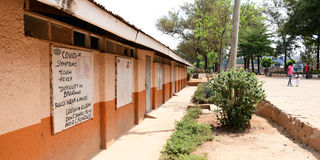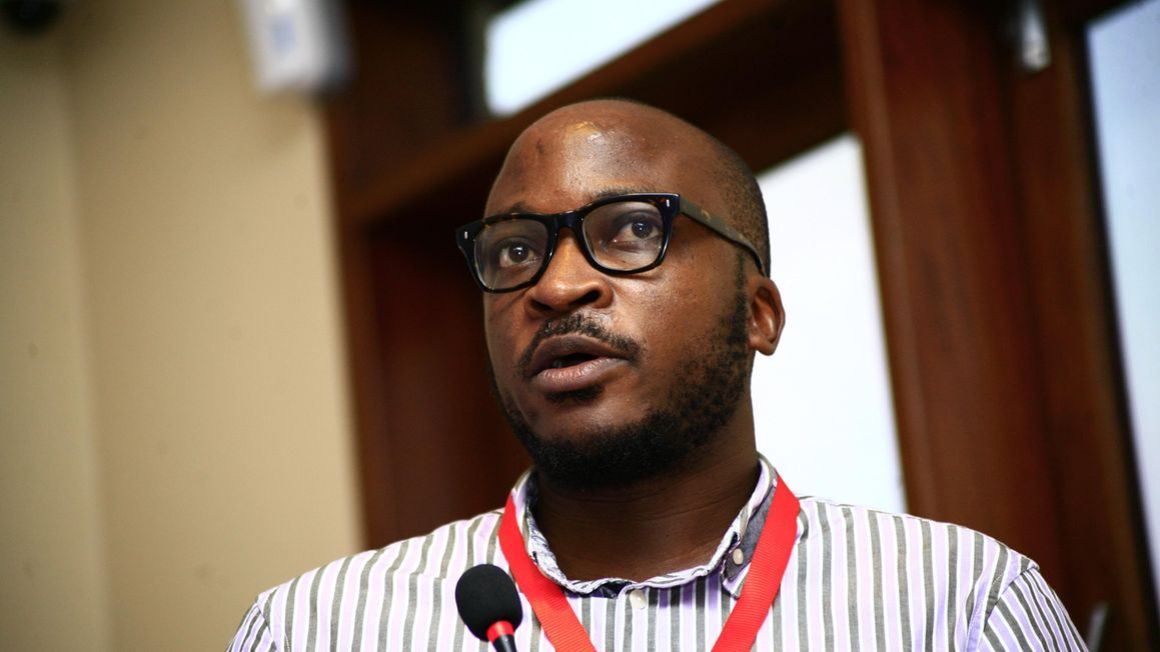Prime
Sciences vs non-sciences: From fiction to realities

Police Children’s School in Kibuli, Kampala, is deserted as Arts teachers went on nationwide strike over pay rise. PHOTO | ABUBAKER LUBOWA.
What you need to know:
- The recent industrial action by Arts teachers over discriminatory salary increment Versus their science counterparts has resurrected debate about what science is. However, Prof Mukwananson A. Hyuha argues that there is hardly any difference between a science teacher and a non-science teacher other than in the relevant fields of specialisation and pedagogical approaches.
As stated in my previous article (Sunday Monitor, December 20, 2020), the history and progress of science have demonstrated, among other things, ‘that there is no useless knowledge’, ‘that more knowledge is better than less’, and ‘that a theory or model formulated using full information is better in explaining the real world and predicting future events in the relevant field, compared to a theory or model based on partial information’.
Further, there is no credible evidence that some knowledge (e.g., the physical or ‘natural’ sciences) is significantly better than or superior to other types of knowledge (e.g., the ‘non-sciences’, that is, the arts and social sciences).
As the saying goes, “One man’s meat is another man’s poison”.
For quite some time, the Uganda government has been putting undue emphasis on the natural sciences. Consequently, policy right now is biased in favour of these sciences at the expense of the ‘non-sciences’.
It is my considered view that this government stance is not correct. The sciences and ‘non-sciences’ actually complement each other; they are not diametrically opposed.
In the 1950s and 1960s, the United States and Canada made the same mistake Uganda is making now; the countries overemphasised sciences at the expense of the ‘non-sciences’. By the end of the 1960s, the countries had overproduced scientists—such as mathematicians, mechanical and electrical engineers and other specialists in the sciences.
As a result, many of the scientists could not find employment in their respective fields of specialisation. Many of these highly qualified scientists had no alternative but to turn their attention to specialisations in the ‘non-sciences’—such as economics and psychology—which offered better employment prospects. For instance, in my Master’s degree level econometrics class in Canada in 1975, out of the six students, three were holders of degrees in the sciences—two with Mathematics degrees (PhD and M.Sc., respectively) and the third with a Bachelor’s degree in engineering.
Further, my Microeconomics professor had a PhD degree in engineering, while my econometrics professor possessed a Mathematics PhD degree (in addition to their PhD degrees in economics); they had also switched from the sciences to the ‘non-sciences’ out of necessity.
This article focuses on the issue of the government’s continuing over-stressing of the sciences at the expense of the ‘non-sciences’.
To drive the point home, I use the recent measures to create a gigantic gap between salaries of ‘scientists’ and those of ‘non-scientists’—especially with reference to teachers. Specifically, I argue that the line of demarcation between the sciences and the non-sciences is not only extremely thin but also blurred.
There is hardly any fundamental difference between teachers of science and those of non-science subjects.
Teachers of science subjects are not necessarily scientists, and teachers of sciences are merely potential scientists.
The stock of knowledge
As I stated in my book Research Methodology: Philosophy, Processes and Procedures, 2020, the entire set of existing knowledge—the set of theoretical and empirical facts and their derivatives in all academic and other fields—can be partitioned into two subsets: the (presumably bigger) subset consisting of what is not known at a point in time and the (probably smaller) subset of what is already known at a point in time. The bigger the subset of known knowledge, the better for humanity. This is because the bigger the subset of known knowledge, the higher the likelihood that mankind will come up with better or superior ways and means to maximise its production and consumption of goods and services, as well as leisure.
In other words, mankind is interested in harnessing the subset of known knowledge for betterment of its welfare. That is, this known knowledge must be expanded over time and harnessed to come up with ways and means of, or technologies for, bettering welfare for the entire human race.
The subset of known knowledge can change either qualitatively or quantitatively. A qualitative change involves improvements in the way the knowledge is stored in libraries and other avenues, or disseminated or transmitted, or shared among users, researchers and various other stakeholders.
For example, libraries may improve storage methods, for instance from microfiche to digital methods.
Teachers, lecturers and other transmitters of knowledge from one individual or generation to another may improve their dissemination or transmission methods with respect to efficiency or pedagogy.
Methods of dissemination or transmission may also improve from physical or face-to-face methods to digital/electronic or virtual techniques.
A quantitative change involves expansion of the entire subset, thereby resulting in increases in the stock of known knowledge. In the absence of divine intervention, it is obvious that the only way to expand the subset of known knowledge is to diminish the subset of unknown knowledge through scientific research, assuming that the entire knowledge set is static. Research aims at discovering or generating new knowledge by extending frontiers of knowledge.
Classifications
In my view, on the one hand, a scientist is that individual who extends the frontiers of knowledge through research; he/she carries out research from time to time—research that leads to the emergence of new knowledge, knowledge available for bettering human welfare and stimulating debates and further research. On the other hand, a science teacher or a teacher of science is a person who just participates in the teaching (dissemination or transmission of knowledge on) a science subject (physics, chemistry, biology, zoology, botany, geology, mathematics, etc.). Dissemination in all forms (teaching at primary and secondary or high schools or institutions, lecturing at universities and other institutions of higher learning, preaching, and other forms of dissemination) is just a means of passing on the known (existing) knowledge from one person (or persons) or generation to another person, or persons, or generations. In general, this dissemination neither expands nor contracts the subset of known knowledge. If dissemination results in a change in existing knowledge, that change is qualitative, rather than quantitative.
A teacher of non-sciences is a person whose duty is to teach (disseminate or transmit knowledge on) a non-science subject (history, literature, linguistics, fine art, music, drama, sociology, political science, philosophy, theology, religious education, etc.). Similar to a teacher of sciences, this (arts or humanities) teacher also just disseminates existing knowledge without adding to its quantity. However, a researcher in the non-sciences adds to the stock of existing knowledge in the same way a researcher in the sciences does; they both extend frontiers of knowledge in their respective fields of research.
It should be noted that, first, a researcher or teacher the world over in whatever academic field is the product of both science and non-science instructors right from the primary level to universities and other education tertiary levels. He/she is shaped or moulded by both science and non-science instructors—not by one or the other—given that all knowledge is useful.
Second, a science teacher and a non-science teacher are both taught the basic contents or materials to be disseminated to their audiences, as well as methods of disseminating the materials (pedagogy)—just like a researcher has to master the materials in his/her field of specialisation plus research methods.
Subject contents are taught in primary and secondary schools and at various faculties, departments and related units at universities.
This is essentially a transfer of known knowledge from teachers and lecturers to pupils and students. Emphasis is placed on mastery or comprehension of the concerned subject contents by the learners.
Pedagogy is delivered at teacher training colleges and faculties of education in universities.
Thus, all students intending to become teachers at all levels of education receive (possibly sufficient) doses of the existing knowledge in their fields of specialisation, as well as pedagogy and some elementary administrative skills. The depth of the doses depends on the planned level of dissemination (nursery, primary school, secondary school and university and other tertiary levels).
There is, therefore, hardly any difference between a science teacher and a non-science teacher other than in the relevant fields of specialisation and pedagogical approaches. A teacher of mathematics differs from a teacher of biology or any other science subject, just like a teacher of literature differs in that respect from a teacher of fine art, linguistics, or any other arts/social sciences subject. These differences are minor, not critical or fundamental.
As explained earlier, a researcher extends the frontiers of knowledge in his/her (science or non-science) field of specialisation. Three basic scientific ‘truths’ should be reiterated here once again:
(i) There is no useless knowledge.
(ii) More knowledge is better than less or no knowledge.
(iii) Sciences and non-sciences are complementary, not competitive or diametrically opposed.
It should also be pointed out that given the unity of science, methods of extending frontiers of knowledge (research methods) in the sciences are basically similar to those in the non-sciences. For example, the scientific method applies to both sciences and non-sciences. Further, a review of the history of (the progress of) science attests to this ‘stylised fact’. I believe I have explained these issues in fair details in my cited book on research methodology.
Examining differences
As pointed out above, a teacher disseminates existing knowledge to various audiences. This dissemination may improve the quality of knowledge, but not its quantity or path of growth. Both teachers of sciences and those of non-sciences basically perform the same function, albeit with minor differences. Both types of teachers are potential researchers; eventually, they can develop into researchers—thereby enabling teachers of science to metamorphose into scientists.
However, as observed earlier, a scientist is the person who extends the frontiers of knowledge. His/her natural habitat is a university, a research institution, or any other tertiary education or academic institution whose preoccupation is to carry out scientific research.
A scientist’s main duty is to augment the stock of knowledge, although his/her activities may also result in qualitative improvements in the stock. Note that a scientist requires a higher level of grounding in his/her (academic) field of specialisation than a teacher in the same field.
Concluding remarks
In my previous article on this issue, I highlighted the fact that ‘non-sciences’ essentially matter a lot in all aspects of society.
They matter as much as the sciences. For example, a policy that ignores ‘non-sciences’ at all stages from initiation to implementation is likely to be suboptimal. This means governments—in their activities like policy formulation, planning, sponsorship of students, handling of health, remuneration and other public (policy) issues and related matters—should put due emphasis on both subsets of knowledge. These subsets are, after all, the two sides of the universal set of knowledge.
Finally, I am still very disappointed by the lack of voices from the ‘non-scientists’ of all walks of life in defence of their spheres of influence. Have they forgotten the contributions to knowledge and prosperity of individuals such as Aristotle, Plato, Socrates, Max Weber, Auguste Comte, Karl Marx, Sigmund Freud, Thomas Kuhn, Karl Popper, Charles Peirce, Paul Feyerabend, Adam Smith, John Maynard Keynes, Milton Friedman, W.W. Rostow and the like? Please, ‘non-scientists’ rise up and (peacefully) defend your professions, values and activities. You have nothing to lose but the yoke or knees that have been placed on your necks.
Prof Mukwananson A. Hyuha is a Professor of Economics, currently based at the Centre for Critical Thinking and Alternative Analysis.




